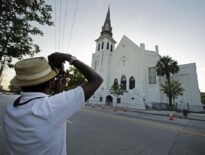Desmond Tutu, South Africa’s Nobel Peace Prize-winning icon, an uncompromising foe of apartheid and a modern-day activist for racial justice and LGBT rights, died Sunday at 90. South Africans, world leaders and people around the globe mourned the death of the man viewed as the country’s moral conscience.



Tutu worked passionately, tirelessly and non-violently to tear down apartheid — South Africa’s brutal, decades-long regime of oppression against its Black majority that only ended in 1994.
The buoyant, blunt-spoken clergyman used his pulpit as the first Black bishop of Johannesburg and later as the Anglican Archbishop of Cape Town, as well as frequent public demonstrations, to galvanize public opinion against racial inequity, both at home and globally.
Nicknamed the Arch, the diminutive Tutu became a towering figure in his nation’s history, comparable to fellow Nobel laureate Nelson Mandela, a prisoner during white rule who became South Africa’s first Black president. Tutu and Mandela shared a commitment to building a better, more equal South Africa.
Nicknamed the Arch, the diminutive Tutu became a towering figure in his nation’s history, comparable to fellow Nobel laureate Nelson Mandela, a prisoner during white rule who became South Africa’s first Black president. Tutu and Mandela shared a commitment to building a better, more equal South Africa.
Tutu’s death on Sunday is another chapter of bereavement in our nation’s farewell to a generation of outstanding South Africans who have bequeathed us a liberated South Africa, South African President Cyril Ramaphosa said.
From the pavements of resistance in South Africa to the pulpits of the world’s great cathedrals and places of worship, and the prestigious setting of the Nobel Peace Prize ceremony, the Arch distinguished himself as a non-sectarian, inclusive champion of universal human rights, he said.
Tutu died peacefully at the Oasis Frail Care Center in Cape Town, the Archbishop Desmond Tutu Trust said. He had been hospitalized several times since 2015 after being diagnosed with prostate cancer in 1997.
He turned his own misfortune into a teaching opportunity to raise awareness and reduce the suffering of others, said the Tutu trust. He wanted the world to know that he had prostate cancer, and that the sooner it is detected, the better the chance of managing it.
In recent years he and his wife, Leah, lived in a retirement community outside Cape Town.
Former U.S. President Barack Obama hailed Tutu as a moral compass for me and so many others. A universal spirit, Archbishop Tutu was grounded in the struggle for liberation and justice in his own country, but also concerned with injustice everywhere. He never lost his impish sense of humor and willingness to find humanity in his adversaries.
Tutu’s life was entirely dedicated to serving his brothers and sisters for the greater common good. He was a true humanitarian said the Dalai Lama, Tibet’s exiled spiritual leader and Tutu’s friend.
His legacy is moral strength, moral courage and clarity, Anglican Archbishop of Cape Town Thabo Makgoba said in a video statement. He felt with the people. In public and alone, he cried because he felt people’s pain. And he laughed — no, not just laughed, he cackled with delight — when he shared their joy.
A seven-day mourning period is planned in Cape Town before Tutu’s burial, including a two-day lying in state, an ecumenical service and an Anglican requiem mass at St. George’s Cathedral in Cape Town. The southern city’s landmark Table Mountain will be lit up in purple, the color of the robes Tutu wore as archbishop.
Throughout the 1980s — when South Africa was gripped by anti-apartheid violence and a state of emergency gave police and the military sweeping powers — Tutu was one of the most prominent Black leaders able to speak out against abuses.
A lively wit lightened Tutu’s hard-hitting messages and warmed otherwise grim protests, funerals and marches. Plucky and tenacious, he was a formidable force with a canny talent for quoting apt scriptures to harness support for change.
The Nobel Peace Prize in 1984 highlighted his stature as one of the world’s most effective champions for human rights, a responsibility he took seriously for the rest of his life.
With the end of apartheid and South Africa’s first democratic elections in 1994, Tutu celebrated the country’s multi-racial society, calling it a rainbow nation, a phrase that captured the heady optimism of the moment.
In 1990, after 27 years in prison, Mandela spent his first night of freedom at Tutu’s residence in Cape Town. Later, Mandela called Tutu the people’s archbishop.
Tutu also campaigned internationally for human rights, especially LGBTQ rights and same-sex marriage.
I would not worship a God who is homophobic, he said in 2013, launching a campaign for LGBTQ rights in Cape Town. I would refuse to go to a homophobic heaven. No, I would say, ‘Sorry, I would much rather go to the other place.’
Tutu said he was as passionate about this campaign as I ever was about apartheid. For me, it is at the same level. He was one of the most prominent religious leaders to advocate LGBTQ rights — a stance that put him at odds with many in South Africa and across the continent as well as within the Anglican church.
South Africa, Tutu said, was a rainbow nation of promise for racial reconciliation and equality, even though he grew disillusioned with the African National Congress, the anti-apartheid movement that became the ruling party after the 1994 election. His outspoken remarks long after apartheid sometimes angered partisans who accused him of being biased or out of touch.
Tutu was particularly incensed by the South African government’s refusal to grant a visa to the Dalai Lama, preventing the Tibetan spiritual leader from attending Tutu’s 80th birthday as well as a planned gathering of Nobel laureates in Cape Town. The government rejected Tutu’s accusations that it was bowing to pressure from China, a major trading partner.





